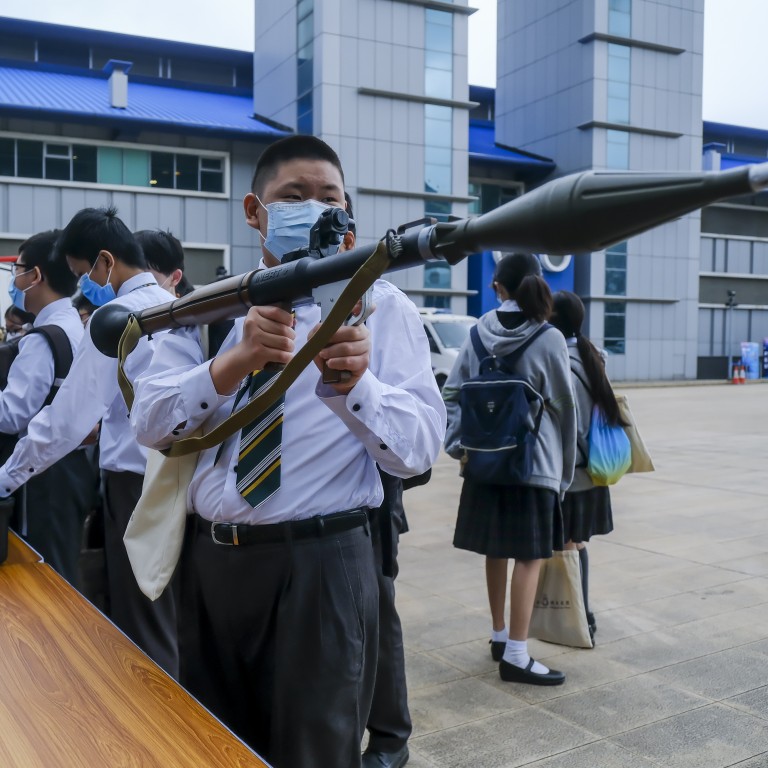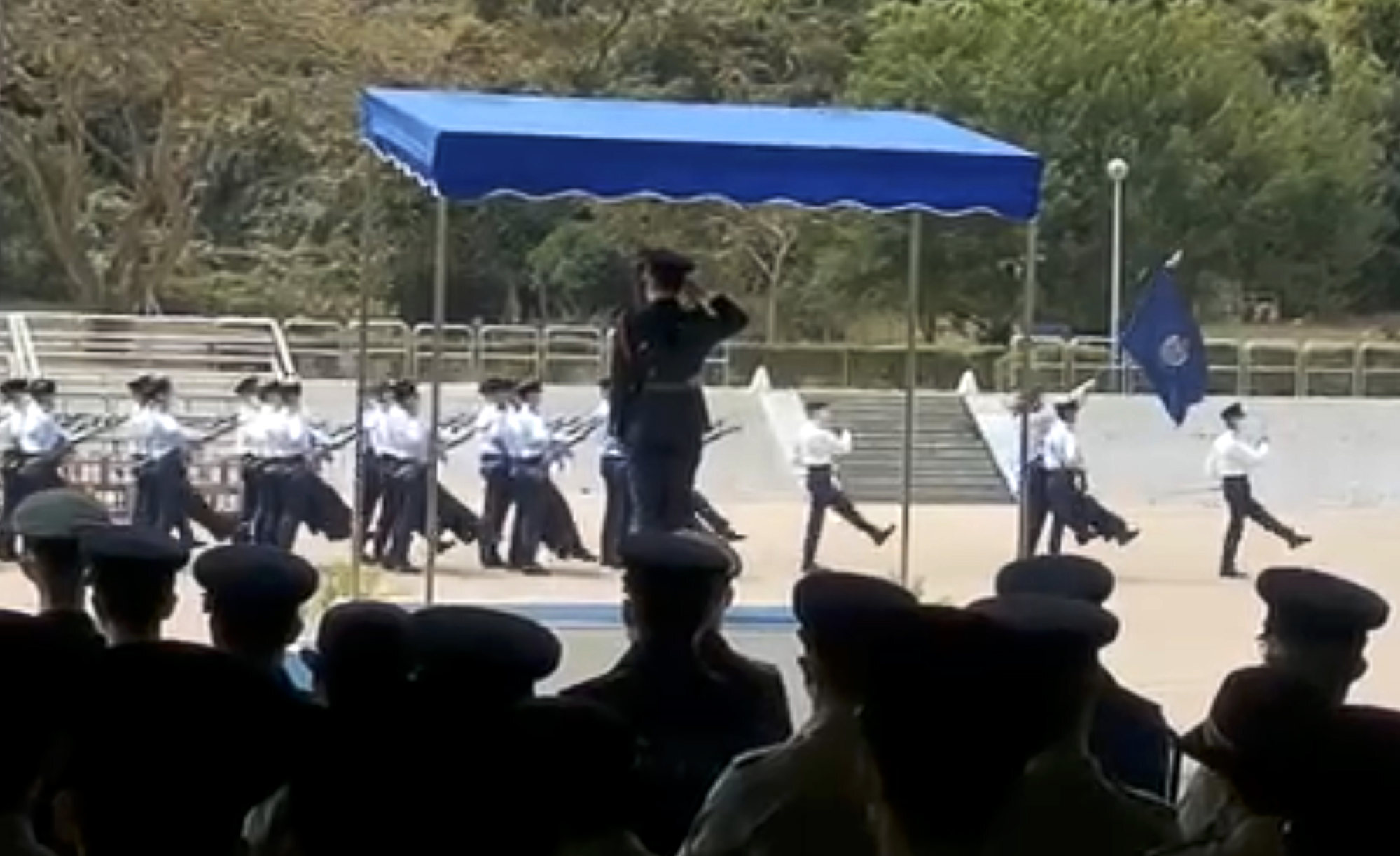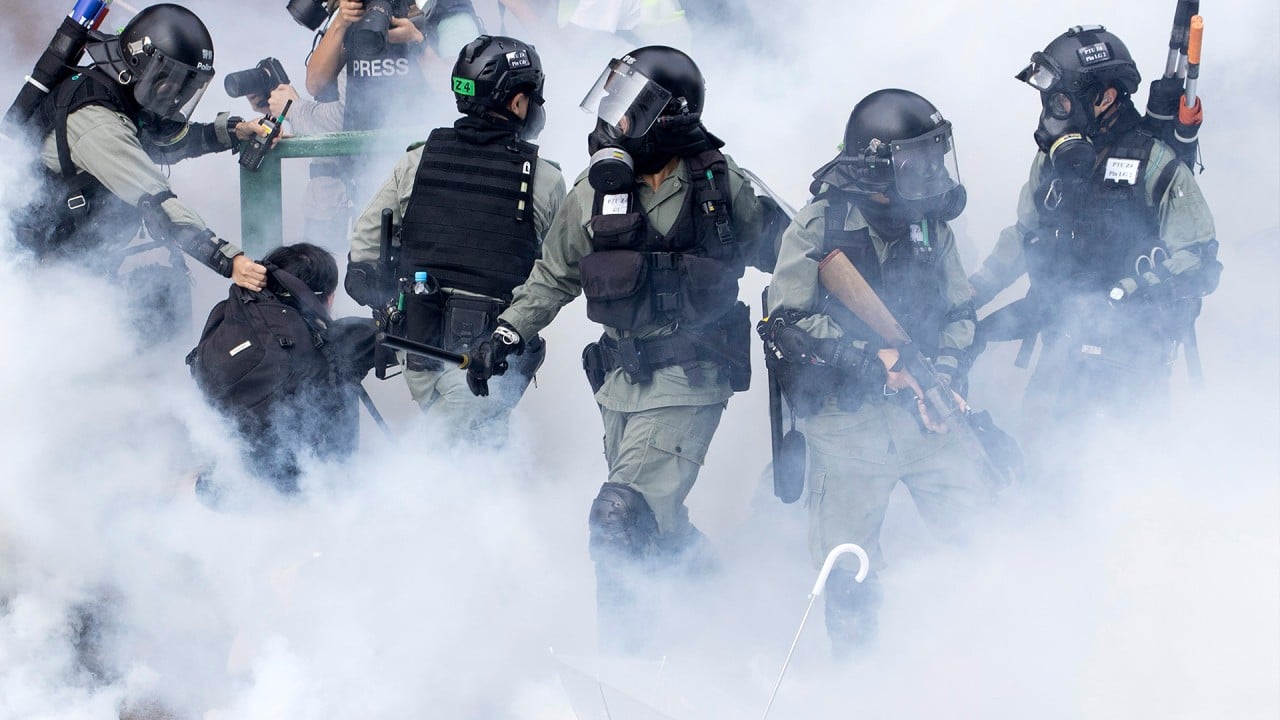
Hong Kong marks National Security Education Day with anti-terrorism drills, weapons displays for students as top official urges resolve in defending ‘bottom line’
- Beijing’s top official in Hong Kong, Luo Huining, urged the local government to remain firm in safeguarding national security, calling it the key to solving a host of social problems
- Director of liaison office adds it is every Hong Kong resident’s responsibility to protect the city’s stability, as they had paid a heavy price during the social unrest of 2019
Hong Kong officially celebrated National Security Education Day on Thursday with citywide events ranging from Chinese military-style marches and anti-terrorism drills to school promotional activities for children and weapons displays for students, while top officials made speeches urging unity to maintain stability and resist foreign interference.
Government departments and supporting community organisations went all out to mark the day for the first time since the imposition of Hong Kong’s national security law by Beijing nine months ago.
Top officials and politicians held a three-hour symposium at the Hong Kong Convention and Exhibition Centre in Wan Chai to hail the legislation for helping restore stability after the anti-government protest chaos of 2019, and to justify the drastic overhaul of the city’s political system that followed.
Among them was Beijing’s top official in Hong Kong, Luo Huining, who urged the local government to remain firm in safeguarding national security, calling it a “bottom line” and key to solving a host of social problems with the central government’s support.
“With [the national security law … the city] now has acquired the necessary prerequisites for addressing deep-seated economic and livelihood issues,” he said. “Neither the central authorities nor local residents will tolerate anyone who ventures to challenge the bottom line of national security and public order.”
Quizzes, ‘children’s smiles’ mark first National Security Education Day since Beijing imposed law
Previously marked only with an annual symposium organised by the Hong Kong Policy Research Institute, April 15 was declared National Security Education Day as part of wider legislation passed by Beijing in 2015.
The city government took over and began organising a variety of activities following the adoption of the national security law last June by the National People’s Congress (NPC) Standing Committee, China’s top legislative body.
Kindergartens and schools were mobilised to mark the day, while the academies of the city’s five disciplined services – police, correctional services, fire services, customs and immigration – organised open days to allow residents to learn more about their work.

Booths were set up in public squares in Central, Tsim Sha Tsui and Sha Tin for residents to have their photos taken for a mosaic wall celebrating national security, while a public exhibition on the topic will be held until May 2 at the City Gallery in Central.
At the Hong Kong Police College parade ground in Wong Chuk Hang, members of the public watched for the first time as officers switched from their traditional British-style drills to goose-stepping marches learned from People’s Liberation Army trainers.
The Special Duties Unit, the Counter Terrorism Response Unit and the Emergency Unit displayed their anti-terrorism skills and equipment, while water cannon trucks and armoured vehicles used during the 2019 social unrest were put on display.
Booths were set up to sell souvenirs and key rings with police anti-riot warnings such as “disperse or we fire”, and “warning, tear smoke”.

School pupils were given a chance to hold rocket launchers and other weapons, while the Government Flying Service demonstrated helicopter medical evacuations.
At the Immigration Department’s training institute in Tuen Mun, children watched goose-stepping parades and were taught how to hold rifles used for drills.
Anti-riot drills were also held at the Correctional Services Department’s Training Institute in Stanley, while professional equipment and firearms were on display at the Hong Kong Customs College.

At the ceremony in Wan Chai, Luo said the national security law and Beijing’s shake-up of Hong Kong’s electoral system had provided the city with an unprecedented level of security and stability.
“Netizens have likened the two strategic moves by the central authorities to the ‘sword’ and ‘shield’ that serve to safeguard the social stability and the future of Hong Kong. I express my full agreement with the netizens,” he said.
Election Committee packed with even more Beijing allies, removing risks in chief executive race
Luo also said the Hong Kong government’s achievements in safeguarding national security were self-evident.
“Now with the laws, mechanisms and manpower in place, the rest comes down to enforcement and implementation … It is the collective responsibility of the [city’s] executive authorities, legislature and the judiciary to safeguard national security,” he said, adding that Beijing was there to help.
“Any attempt by foreign countries and external forces to flagrantly interfere in the affairs of Hong Kong, and to exploit Hong Kong as a pawn will be met with impactful countermeasures so that they will learn a lesson,” he said.
“The central authorities will, as always, lend full support to the [city’s] institutions of power for its lawful crackdown on criminal activities … and to those individuals and institutions that have been subjected to threat and sanctions for safeguarding national security.”
Also speaking at the forum were: Chief Executive Carrie Lam Cheng Yuet-ngor; Zheng Yanxiong, head of Beijing’s national security office in Hong Kong; Yang Yirui, acting commissioner of the Chinese foreign ministry’s office in the city; and Major General Chen Daoxiang, commander of the PLA’s local garrison.
She added that her administration had also introduced a bill on Wednesday to enact sweeping changes approved by the NPC Standing Committee to overhaul Hong Kong’s electoral system.
Lam said her government would continue to promote the need for every Hongkonger to safeguard national security.
The audience also listened to a series of pre-recorded speeches on security in the context of political, economic, territorial and military issues.

Political speakers included former liaison office legal affairs director Wang Zhenmin, former justice minister Elsie Leung Oi-sie and former top prosecutor Grenville Cross, while Financial Secretary Paul Chan Mo-po and Hong Kong Monetary Authority chief executive Eddie Yue Wai-man were among others providing economic perspectives.



